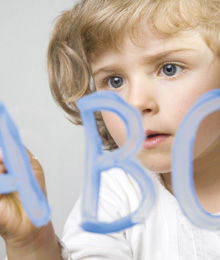Andrea Marchini: A pep talk on early intervention
July 25, 2012 by Andrea Marchini
Filed under Health

Talk. Walk. Play. The job description of a child may sound simplistic, but babies are in fact involved in the very complex business of brain development.
At this exceptionally young age, babies are engaged in what is perhaps the most important occupation they will ever undertake — learning language. Children quickly discover that communication offers a precious connection to the world in which they can share their likes, needs and feelings, and socially bond with those they love. In fact, no skill will be more critical to a child’s well-being and success in life than the skill to communicate.
From the earliest moment, a baby stumbles across the discovery that a cry, gesture or babble are clever expressions of his needs and wants. By his first birthday, he has spent copious amounts of energy absorbing words for familiar people and objects, and he has likely said his first words. By the toddler’s second birthday, his mounting vocabulary of single words gives way to two-word combinations, and by age three, the child is talking in sentences. By age four, and much to the delight of his parents, the child begins to sound like a “little adult”, now an engaging conversational partner.
This is the developmental sequence in which speech and language skills develop for most children. For one out of 10 children in North America, however, this language learning process is not quite as easy. In fact, speech and language difficulty is the most common problem facing preschoolers in Ontario. Research has shown that oral language abilities contribute to emotional and social well-being, and are a significant predictor of academic success. Strong spoken language skills are the building blocks of learning to read and write, and should be in place prior to entering kindergarten. These reasons alone reinforce that early detection and intervention of speech and language issues are critical, and no doubt have implications on future success. So, how does a parent recognize if their child is experiencing speech and language problems? How does a parent know when to seek help for their child’s speech and language development, and when is it OK to simply trust the maturation process and allow their child time to develop? Is it enough to just “wait and see?”
Unfortunately, parents often find themselves inundated by well-meaning assurances and common misconceptions, such as: Boys talk later than girls, other children in the family didn’t talk until they were three, every child develops at their own pace. All of these statements claim that children will “outgrow” their difficulties or delays. Although some children do catch up, it’s difficult to predict which children will. Speech and language difficulties persist in as many as three out of 10 children.
The following guidelines may help you identify speech and language concerns in your child:
- By 18 months old, your child does not use at least 20 words, including nouns (“bottle” and “cookie”), verbs (“eat” and “sleep”), location words (“up”), descriptive words (“cold,” “sleepy”) and social words (“hi” and “bye”)
- By 24 months, your child does not use at least 100 words and combine 2 words together (“more cookie,” “mama go,” “push car”)
- Your child doesn’t seem to have a good understanding of what you say, or cannot follow multi-step directions
- People have a difficult time understanding what your child says
- Your child becomes frustrated by his difficulties communicating
- Your child stutters by repeating words or sounds (“b-b-b-b-all”) and/or stretching sound (“sssssssun”)
As a parent, trust your instinct. If you have questions about your child’s speech and language development, it is always best to consult a speech-language pathologist or your family doctor. Early intervention is effective intervention.







Comments
Feel free to leave a comment...
and oh, if you want a pic to show with your comment, go get a gravatar!